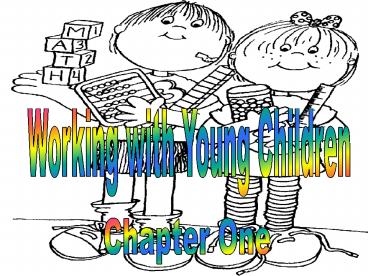Chapter One - PowerPoint PPT Presentation
1 / 20
Title:
Chapter One
Description:
National Association for the Education of Young Children (NAEYC) ... 'Code of Ethical Conduct' guidelines established by the NAEYC. To continue to learn ... – PowerPoint PPT presentation
Number of Views:76
Avg rating:3.0/5.0
Title: Chapter One
1
Working with Young Children
Chapter One
2
Early Childhood
- covers the period from birth to nine years of
age - Growth very rapid
- Develops
- Sense of self
- Language
- Social and emotional skills
- Problem-solving skills
- Motor skills
- Important foundation for later learning
3
Social and Economic Changes
- Changes in families
- Non-traditional
- Changes in employers attitudes
- Sponsored child care
- Employee benefit
- Company payoffs
- May offer childcare assistance
- Resource and referral service
- Emergency backup arrangements
4
Changes in Education Attitudes
- 6 versus 33
- Developmental needs
- Licensed and accredited
- Half day vs full day kindergarten
- More public ed monies to early childhood ed.
5
Career Opportunities in Early Childhood
- Nannies
- Au pairs
- Kindergarten teachers
- Child care teachers and directors
- Licensing specialists
- Others pg. 16
6
Education Training Needed to Work with Young
Children
- Entry-level
- child development associate(CDA) credential-
- Two-year associate degree
- Bachelors degree
- Graduate degree
7
Teachers Responsibilities
- Interact with children
- Influence children
- Space and activities
- CHALLENGING AND REWARDING!!
8
- To know how children grow and develop
- To plan a developmentally appropriate curriculum
- To prepare the environment
- To communicate effectively
- To demonstrate teamwork
- To manage time wisely
- To participate in professional organizations
- To follow ethical standards
- To continue to learn
9
To know how children grow and develop
- Understand child growth and development
- Abilities and interests at different ages
- Helps prepare inviting and developmentally
appropriate environments - Assist in developing curriculum that is
challenging - Work effectively with individuals and groups
10
- Behavior brings them pleasure
- Learn from other people and you
- Teach positive interaction
- Cooperative and skillful in getting along with
others
11
To plan a developmentally appropriate curriculum
- whole child- social, cognitive, physical, and
emotional development - Physical- coordination, stamina, flexibility,
strength, and sensory awareness - Social- interact positively with other children
and adults adapt to expectations - Cognitive- acquire information to understand and
function in worldproblem solve through hands on
activities - Emotional- understand themselves, recognize,
label, and accept feeling assert rights in
culturally acceptable way
12
To prepare the Environment
- Inviting and stimulating
- Encourage to independently experiment, explore,
and manipulate - Interaction with variety of materials
13
To communicate effectively
- Positive communication skills
- Inform explain guide
- Effective communication with parents
- Meaningful relationships with colleagues
14
To demonstrate teamwork
- Work as a team
- Make coworkers feel important
- Support through actions and words
- Know how to resolve conflicts
15
To manage time wisely
- Organize time
- Set priorities
- Distinguish between important and urgent matters
16
To participate in professional organizations
- National Association for the Education of Young
Children (NAEYC) - Helps keep you up to date on new developments
17
To follow ethical standards
- ethics- guiding set of moral principles
- Ethical- conforming to accepted standards of
conduct - Need to practice ethical behavior at all times
- Maintain highest standards of ethical conduct
- Always open to new ideas and and suggestions
- Code of Ethical Conduct guidelines established
by the NAEYC
18
To continue to learn
- A teacher never finishes learning
- Need to be a committed lifelong learner
19
Characteristics of Successful Teachers
- Build your own strengths and develop your own
style - Best suits your personality
- Successful teachers have common characteristics
20
Characteristics of successful teachers
- Fondness for children
- Patience
Sense of Humor
Compassion
Confidence
Commitment
Physical Mental Health
Personal Desire































